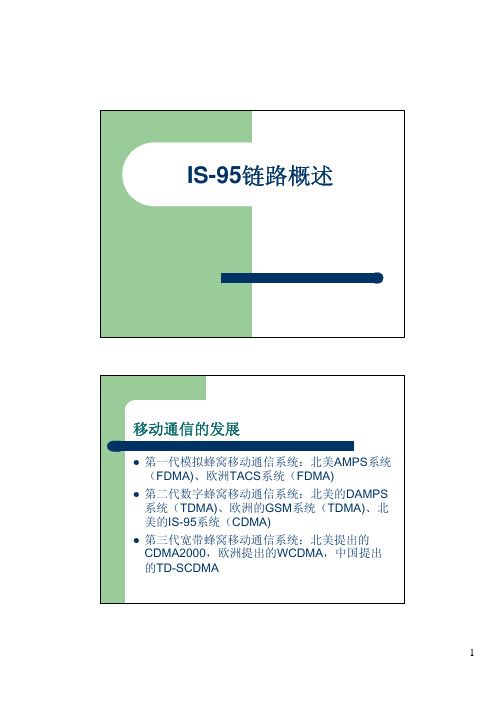- 1、下载文档前请自行甄别文档内容的完整性,平台不提供额外的编辑、内容补充、找答案等附加服务。
- 2、"仅部分预览"的文档,不可在线预览部分如存在完整性等问题,可反馈申请退款(可完整预览的文档不适用该条件!)。
- 3、如文档侵犯您的权益,请联系客服反馈,我们会尽快为您处理(人工客服工作时间:9:00-18:30)。
7
Course Syllabus
Grading
Homework and Class Attendance 20% midterm 30% Final Project 50%
8
Course Syllabus
Paper Report
Students will participate in one or two person groups to prepare a report on a hot topic in wireless communications of their choosing.
Wireless Communications
Course Syllabus
Spring 2007
Course Syllabus
General Information
Credits: 3 Creditaport “Wireless Communications: Principles and Practice”, Second Edition, Prentice Hall, ISBN 0- 13- 042232-0, 2002. Recommended Reading: Simon Haykin, Micheal Moher “Modern Wireless Communications”, 2005 William Stallings “Wireless Communications and Networks”, 2002
4
5
Topics to be covered, following the outline of the Rappaport course textbook
Introduction to Wireless Communication systems ( Chapter 1) Modern Wireless Communication Systems ( Chapter 2) Cellular System Design Concepts ( Chapter 3) Mobile Radio Propagation: Large- Scale Path Loss ( Chapter 4) Mobile Radio Propagation: Small- Scale Fading and Multipath ( Chapter 5) Modulation Techniques for Mobile Radio( Chapter 6) Diversity and Channel Coding( Chapter 7) Multiple Access Techniques( Chapter 9)
10
Candidate Papers for Student Presentations (1)
Any paper from IEEE Wireless Communications Magazine Henry, P.S.; Hui Luo, "WiFi: what's next?" December 2002. Allotted to Chong Wee-Cheak, Wu Rongying and Li Tian Chiussi, F.M.; Khotimsky, D.A.; Krishnan, S., "Mobility management in third-generation all-IP networks," September 2002. Akyildiz, I.F.; Weilian Su; Sankarasubramaniam, Y.; Cayirci, E., "A survey on sensor networks," August 2002. Maniatis, S.I.; Nikolouzou, E.G.; Venieris, I.S., "QoS issues in the converged 3G wireless and wired networks," August 2002. Sairam, K.V.S.S.S.S.; Gunasekaran, N.; Redd, S.R., "Bluetooth in wireless communication," June 2002. Allotted to Rakesh Sachdeva, Meenakumari Athmanathan and Raihan Syed Gossain, H.; Cordeiro, C.D.M.; Agrawal, D.P., "Multicast: wired to wireless," June 2002. Rappaport, T.S.; Annamalai, A.; Buehrer, R.M.; Tranter, W.H., "Wireless communications: past events and a future perspective," IEEE Communications Magazine, May 2002, 50th Anniversary Issue.
3
Course Syllabus Course Description
Principles of wireless communication analysis and design. Digital communication basics, cellular radio, wireless PCS communications, multiple access techniques, channel coding and equalization, and standards of digital cellular/ PCS systems, wireless LAN, Mobile ad hoc network
Course Objectives and Rough Syllabus
This course is meant to serve as a survey of the issues involved with wireless communications, serving as a bridge from cellular system design and propagation modeling to data networking.
6
Orthogonal Frequency-Division Multiplexing (OFDM) Wireless LANs (802.11) Mobile Networking and System and Other Recent Technological Developments (Chapters 10 and 11, plus additional materials) WiMax (802.16) Mobile Ad Hoc Networks
This will consist of a review of three papers from IEEE Communications Magazine or IEEE Personal Communications Magazine.
The report should relate to the semester project. A plan for further investigation of that topic through a semester project will be prepared, including a description of the intended work, a plan of activities, distribution of labor within the team, and a schedule.
9
Semester Project
The purpose of the semester project is to give students the opportunity to work in teams to explore a wireless communications topic in more depth beyond class lectures. Each project will first entail background reading with a report. The project should involve a simulation or analytical design or analysis activity. At the conclusion of the project, the team will prepare a project final report, and provide an oral presentation as a team to the class. Full details on the semester project will be provided at a later time.
David Tse, Pramod Viswanath, “Fundamentals of Wireless Communication”, 2005 (/~dtsw) Papers (in Appendix)
2
Prerequisite: the principles and fundamentals of communication systems ( signals and systems, Fourier transform and applications, frequency domain representation of signals, probability and random variables, analog and digital modulation techniques. ) Class Hours: Wednesdays 09: 15 to 12: 20 Office Hours: Wednesdays 13:20 to 15:00 Instructor: Dr. Chen Tso-Cho (陳作舟) Telephone: 0922246688 E- mail: chentc@.tw





